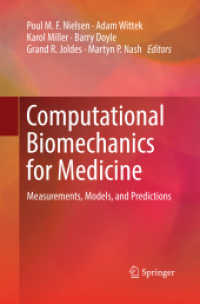- ホーム
- > 洋書
- > 英文書
- > History / World
Full Description
This book is a vital exploration of the harrowing stories of mass displacement that took place in the first half of the 20th century from the perspective of forced migrants themselves. The volume brings together 15 interrelated case studies which show how the deportation, evacuation and flight of millions of people as a result of the First World War intensified rather than alleviated ethnic conflicts which culminated in population transfers on an even larger scale during and immediately after the Second World War. While each chapter focuses on a different group of refugees and displaced persons, the text as a whole looks at the experience of forced migration as a complex set of evolving relationships with the receiving society, the homeland, the broader diaspora and other migrant communities living within the same host country. This innovative, four-dimensional model provides an overarching conceptual framework that binds the chapters together within the longer arc of European history.
By going beyond the conventional narratives of national victimhood and (un)successful assimilation of refugees, A Transnational History of Forced Migrants in Europe reveals that identities of forced migrants in the first half of the 20th century were individualised, hybrid and constantly reconstructed in response to socioeconomic forces and political pressures. The case studies collected in this volume further suggest that age, gender, social class, educational level and the personal experiences of 'unwilling nomads' are more important to the understanding of forced migration history than ethnoreligious identities of victims and perpetrators.
Contents
Foreword, Andreas Kossert
Introduction: Unwilling Nomads: A Four-Dimensional Model of Diaspora, Bastiaan Willems (Lancaster University, UK) and Michal Adam Palacz (Oxford Brooks University, UK)
Part I - Forced Migrants during the First World War
1. Population movement, evacuation and internment in Habsburg Galicia during the First World War: Considering the four-dimensional model of diaspora, Serhiy Choliy (Sikorsky Kyiv Polytechnic Institute, Ukraine)
2. Humiliated and insulted: The multiple categories of Austro-Hungarian civilian internees, 1914-17, Egor Lykov (ETH Zurich, Switzerland)
3. Between Suffering and Displacement: The Case of the Istrian 'Evakuirci', Diego Han (University of Zagreb, Croatia)
Part II - Political Emigrants in the Interwar Era
4. Salvaging the 'unredeemed' in Italy: The Kingdom of Yugoslavia and the Julian March émigrés, Miha Zobec (Slovenian Academy of Sciences and Arts, Slovenia)
5. Ukrainian emigration in the Weimar Republic and its role in German foreign policy, Veronika Weisheimer (European University Viadrina Frankfurt, Germany)
6. Protecting the national identity of Russian emigrants and their children in interwar Eastern Europe, Aleksandra Mikulenok (Russian State University of Justice, Russia)
Part III - People on the move in fascist Europe
7. Stefi Kiesler: A Librarian as 'Intellectual Refugee Service', Jill Meißner-Wolfbeisser (University of Vienna, Austria)
8. The catalysts of 1938: European child evacuations as humanitarian innovation, Chelsea Sambells (University of Huddersfield, UK)
9. 'And Without a Hat!': Refugee women in the transit country Portugal after 1933, Katrin Sippel (Austrian Society for Exile Studies, Austria)
10. Many Journeys of Exile: Spanish Republican Refugees in France, 1939-1946, David Messenger (University of South Alabama, USA)
11. Reclaimed for the Volk: Forced Migration and Assimilation in the Wartime Third Reich, Bradley J. Nichols (University of Missouri, USA)
Part IV - Refugees and displaced persons and the Second World War
12. The surviving remnant: Subjectification and self-organization in the Jewish DP camp Bergen-Belsen, 1945-8, Lennart Onken (Neuengamme Concentration Camp Memorial, Hamburg, Germany)
13. Resettling, repatriating and 'rehabilitating' Polish displaced persons in British-occupied Germany, 1945-51, Samantha K. Knapton (University of Nottingham, UK)
14. Ethnopolitical humanitarianism: The post-war resettlement of 2,446 Danube Swabians to Brazil, Cristian Cercel (Ruhr-University Bochum, Germany)
15. Anti-communists, communists and migrants in France, 1917-53, Aaron Clift (University of Oxford, UK)
Conclusion: Polish Refugees and East Prussian Expellees: Applying the Four-Dimensional Model, Bastiaan Willems (Lancaster University, UK) and Michal Adam Palacz (Oxford Brooks University, UK)
Concluding Remarks, Pertti Ahonen (University of Jyväskylä, Finland)
Index








